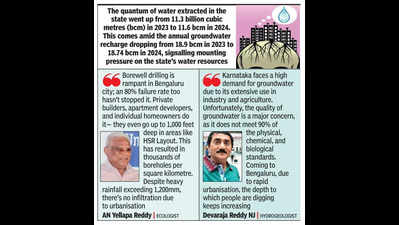- News
- B’luru reports 100% groundwaterextraction, stays in critical zone
B’luru reports 100% groundwaterextraction, stays in critical zone
Bengaluru: Groundwater exploitation remains at a critical level in Bengaluru Urban and Rural districts, which reported a 100% extraction rate during 2024. The groundwater extraction rate in Karnataka, however, was 68.4%, according to the Central Groundwater Board's National Compilation on Dynamic Ground Water Resources of India, 2024.
The groundwater extraction rate or stage of extraction (SOE) as it is also known, reflects the annual groundwater extraction for all kinds of uses against the annual extractable resources. According to the board's guidelines, a 100% extraction rate is termed critical and less than 70% is considered safe.
The groundwater extraction rate was 100% in Bengaluru Urban and Rural districts in 2022 and 2023 too. Data from the Karnataka Groundwater Directorate, the authority set up by the state govt, also suggests that groundwater resources in these two districts are over-exploited with an extraction rate of over 100%.
"Bengaluru extracts double the groundwater it recharges. The situation has been the same for the last 13 years. We have made suggestions to all civic bodies to dig rain harvesting pits, spread awareness about groundwater recharge and encourage the use of treated water, among others. Tank filling projects at KC Valley, HN Valley and Vrishabhavathi Valley are also some of the positive efforts for increasing the groundwater table," a directorate source said.
"We have implemented over 3,000 rainwater harvesting projects in schools, colleges, and religious places across the city. But rainwater harvesting need not be a one-entity endeavour. Residents also have to play an important role to make this a success," BWSSB chairman Ram Prasath Manohar said.
The groundwater extraction in Karnataka, according to the board, may be in the safe zone, but it is steadily climbing, from 66.3% in 2023 to 68.4% a year later. The quantum of water extracted in the state went up from 11.3 billion cubic metres (bcm) in 2023 to 11.6 bcm in 2024. This comes amid the annual groundwater recharge dropping from 18.9 bcm in 2023 to 18.74 bcm in 2024, signalling mounting pressure on the state's water resources.
While Karnataka has substantial groundwater potential, almost 20% of its taluks are already in the over-exploited category, leaving many areas vulnerable to water scarcity in the near future. Experts warn that if this trend continues, the state's groundwater reserves could be drained, causing long-term damage to both agriculture and public health.
Experts have voiced concerns over groundwater contamination by chemicals like nitrates, mercury, cadmium and fluoride, which, they fear, severely impacts public health.
———
Quotes
Borewell drilling is rampant in Bengaluru city; an 80% failure rate too hasn't stopped it. Private builders, apartment developers, and individual homeowners do it— they even go up to 1,000 feet deep in areas like HSR Layout. This has resulted in thousands of boreholes per square kilometre. Despite heavy rainfall exceeding 1,200mm, there's no infiltration due to urbanisation."
- AN Yellapa Reddy, ecologist
——
Karnataka faces a high demand for groundwater due to its extensive use in industry and agriculture. Unfortunately, the quality of groundwater is a major concern, as it does not meet 90% of the physical, chemical, and biological standards. Coming to Bengaluru, due to rapid urbanisation, the depth to which people are digging keeps increasing
- Devaraja Reddy NJ, hydrogeologist
End of Article
FOLLOW US ON SOCIAL MEDIA










